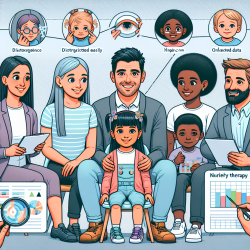Introduction
As a speech-language pathologist, your mission is to foster communication and language development in children. While your expertise and dedication are critical, integrating data-driven insights can significantly enhance the outcomes of your therapy sessions. This blog explores how findings from a global review on legal restrictions in sexual and reproductive health can inform your practice, improve your skills, and encourage further research.
The Power of Data-Driven Decisions
Data-driven decisions are essential in creating effective therapy plans. By analyzing data, practitioners can identify patterns, understand the impact of interventions, and tailor their approaches to meet the unique needs of each child. The research article "Why a good law is not always good enough: a global review of restrictions to supportive laws for sexual and reproductive health and rights" highlights the importance of looking beyond the existence of supportive laws to understand the legal restrictions that impact health outcomes.
Implementing Research Outcomes
While the research focuses on sexual and reproductive health, the underlying principles can be applied to speech-language pathology. Here are some ways you can implement these insights:
- Identify Barriers: Just as legal restrictions can limit access to health services, identify potential barriers in your therapy practice. This could include environmental factors, lack of resources, or specific challenges faced by the child.
- Advocate for Change: Use data to advocate for changes in your practice or institution. This could involve proposing new therapy methods, requesting additional resources, or highlighting the need for policy changes.
- Customize Therapy Plans: Tailor your therapy plans based on data insights. Understand which strategies are most effective for different communication disorders and adjust your approach accordingly.
Encouraging Further Research
Continued research is vital for advancing the field of speech-language pathology. The study's findings suggest that examining legal environments can provide insights into health access and outcomes. Similarly, researching the effectiveness of different therapy techniques can lead to improved practices and better outcomes for children.
Consider collaborating with other professionals to conduct research studies or participate in existing research projects. Sharing your findings with the broader community can contribute to the collective knowledge and drive innovation in the field.
Conclusion
By integrating data-driven insights into your practice, you can enhance the effectiveness of your therapy sessions and create better outcomes for children. The research article provides a valuable model for analyzing barriers and advocating for change. Embrace the power of data and research to continually improve your skills and make a positive impact on the lives of the children you serve.
To read the original research paper, please follow this link: Why a good law is not always good enough: a global review of restrictions to supportive laws for sexual and reproductive health and rights.










